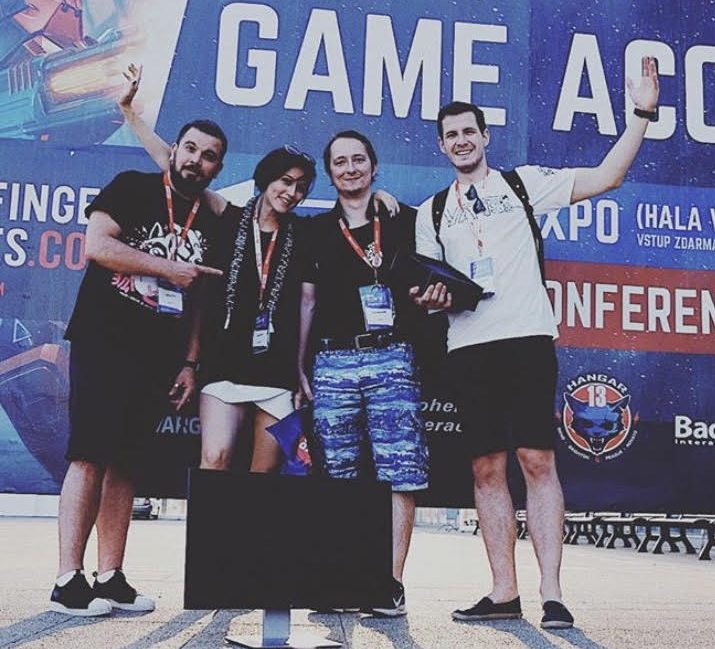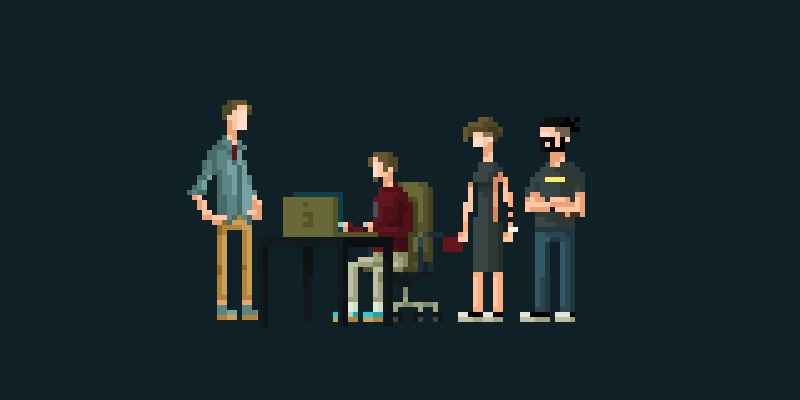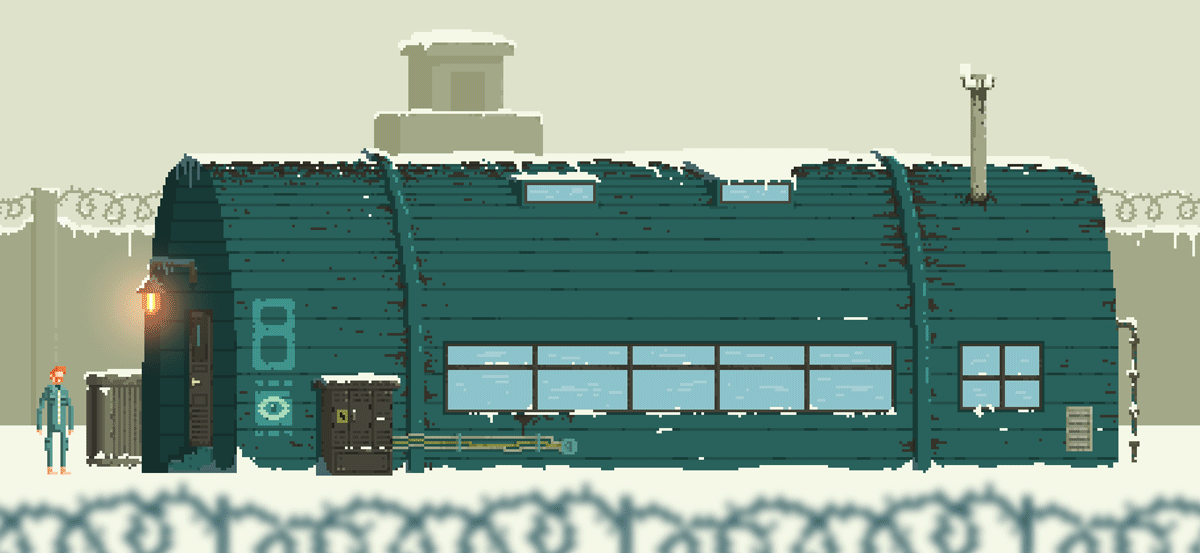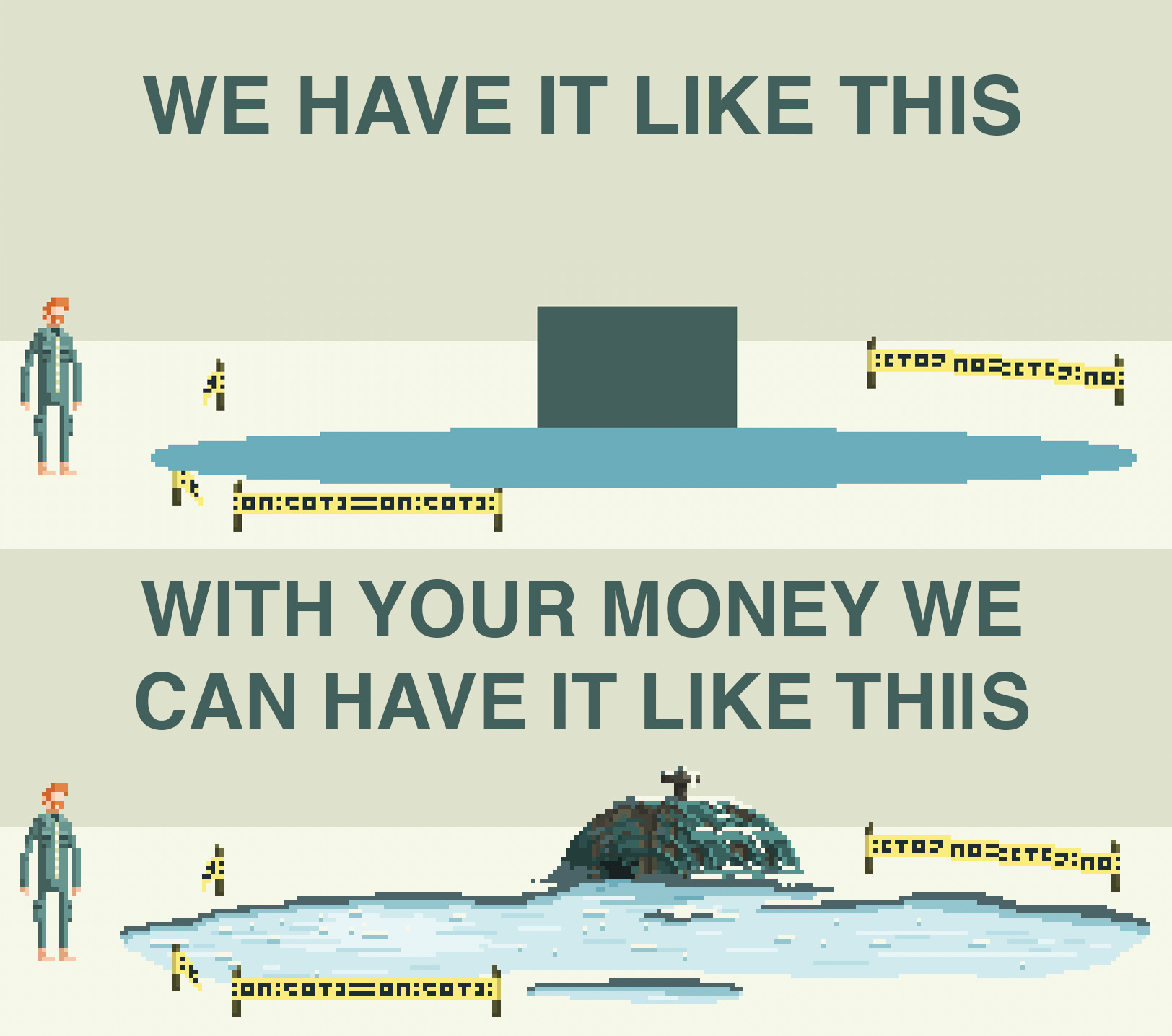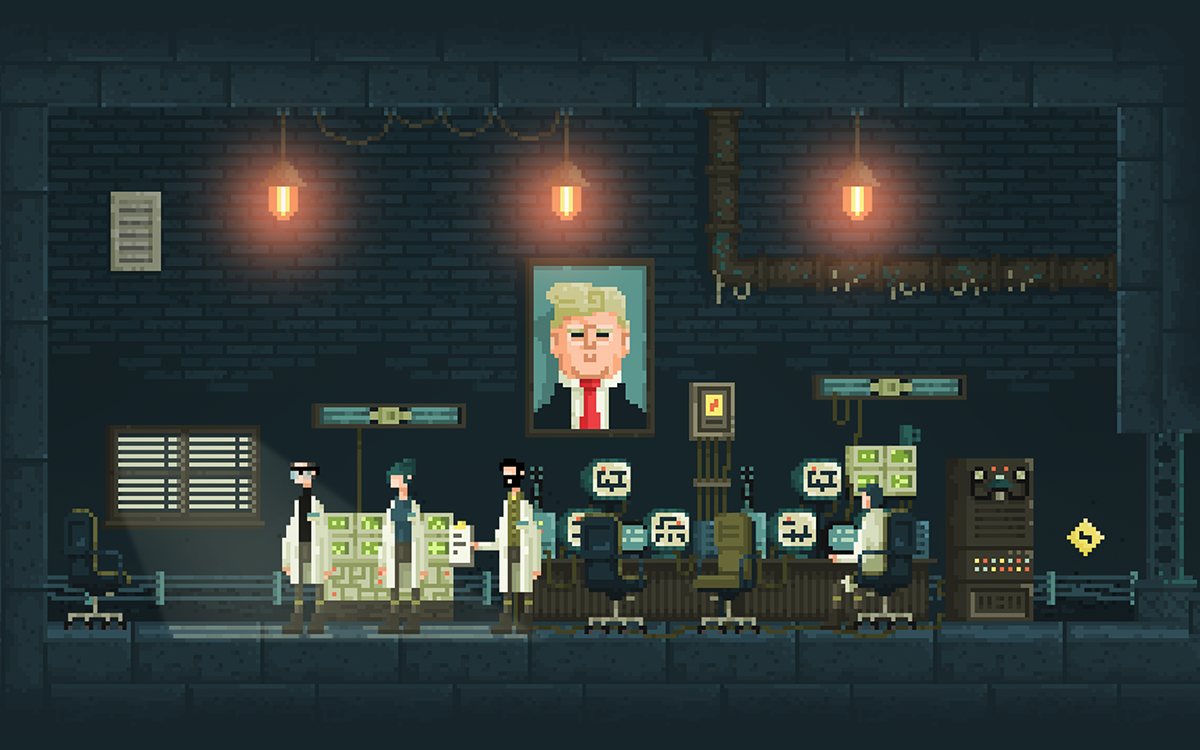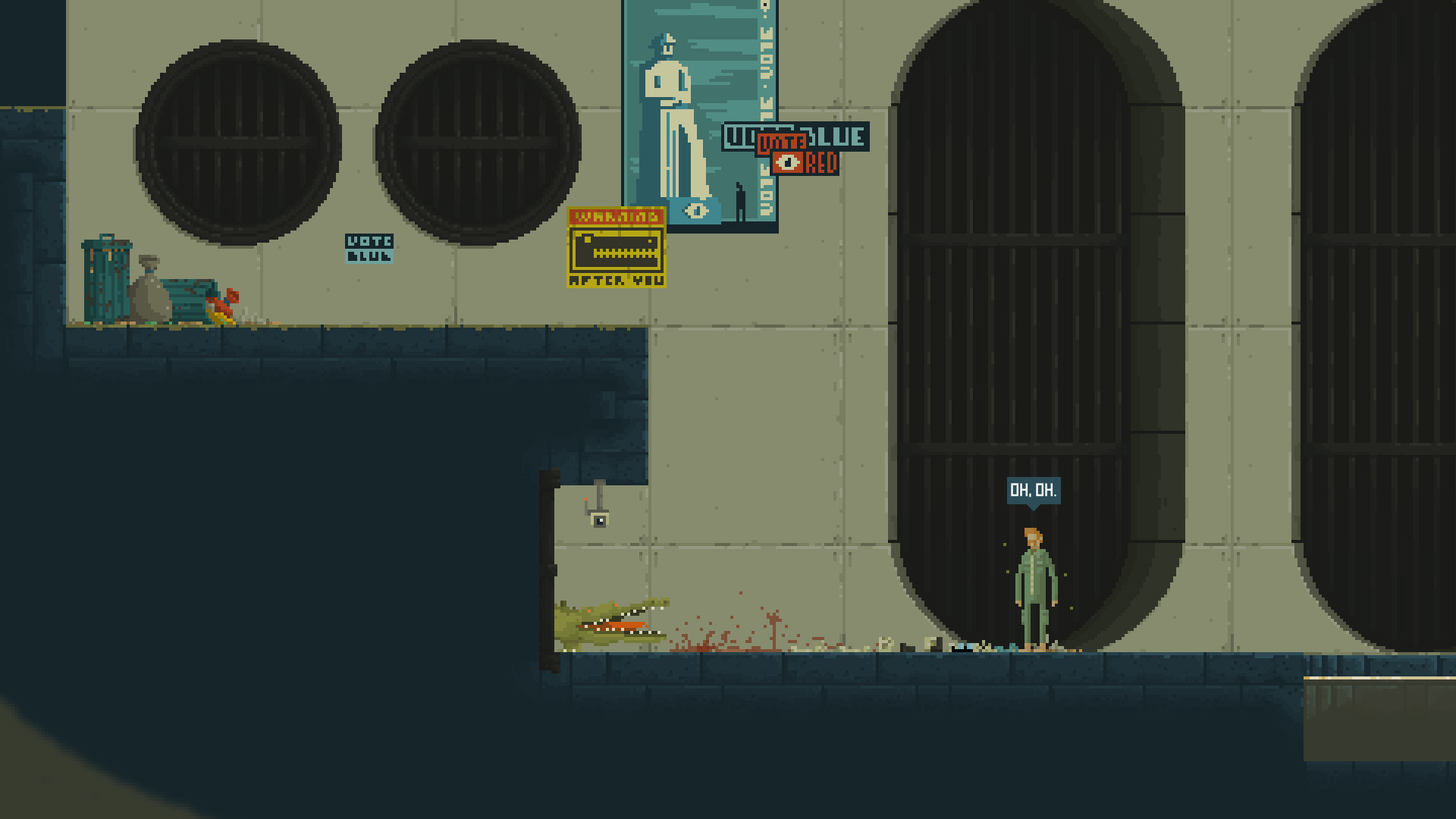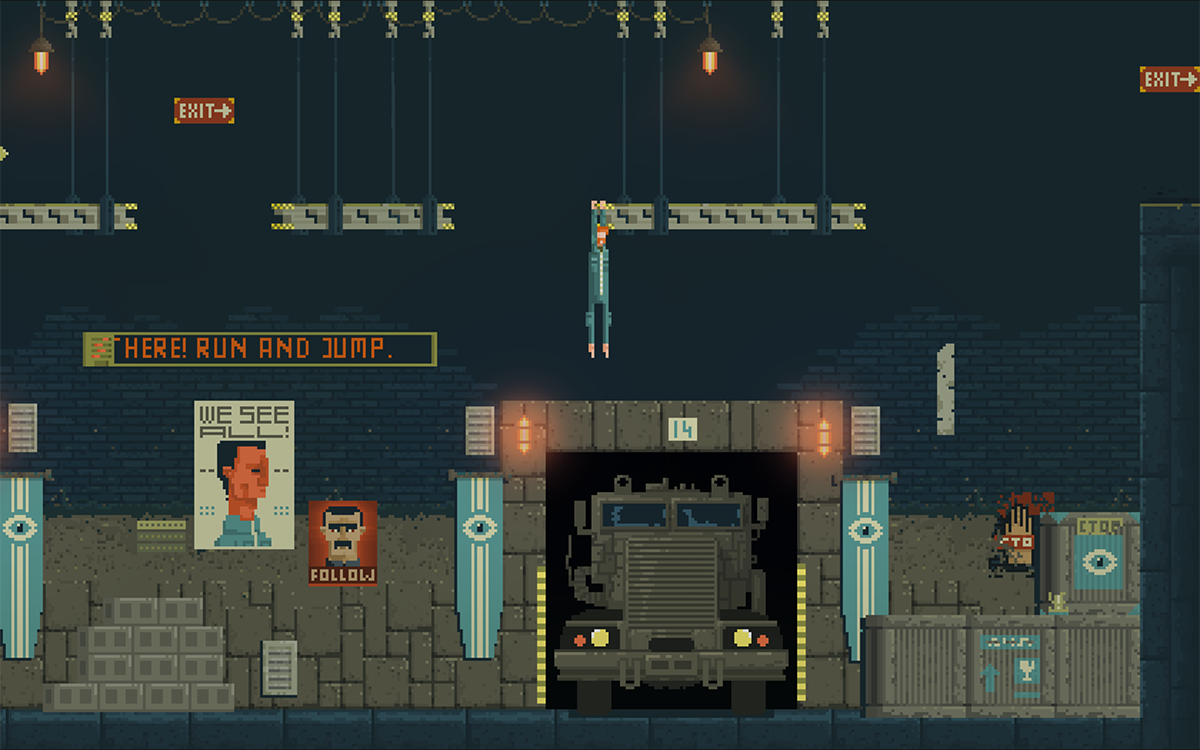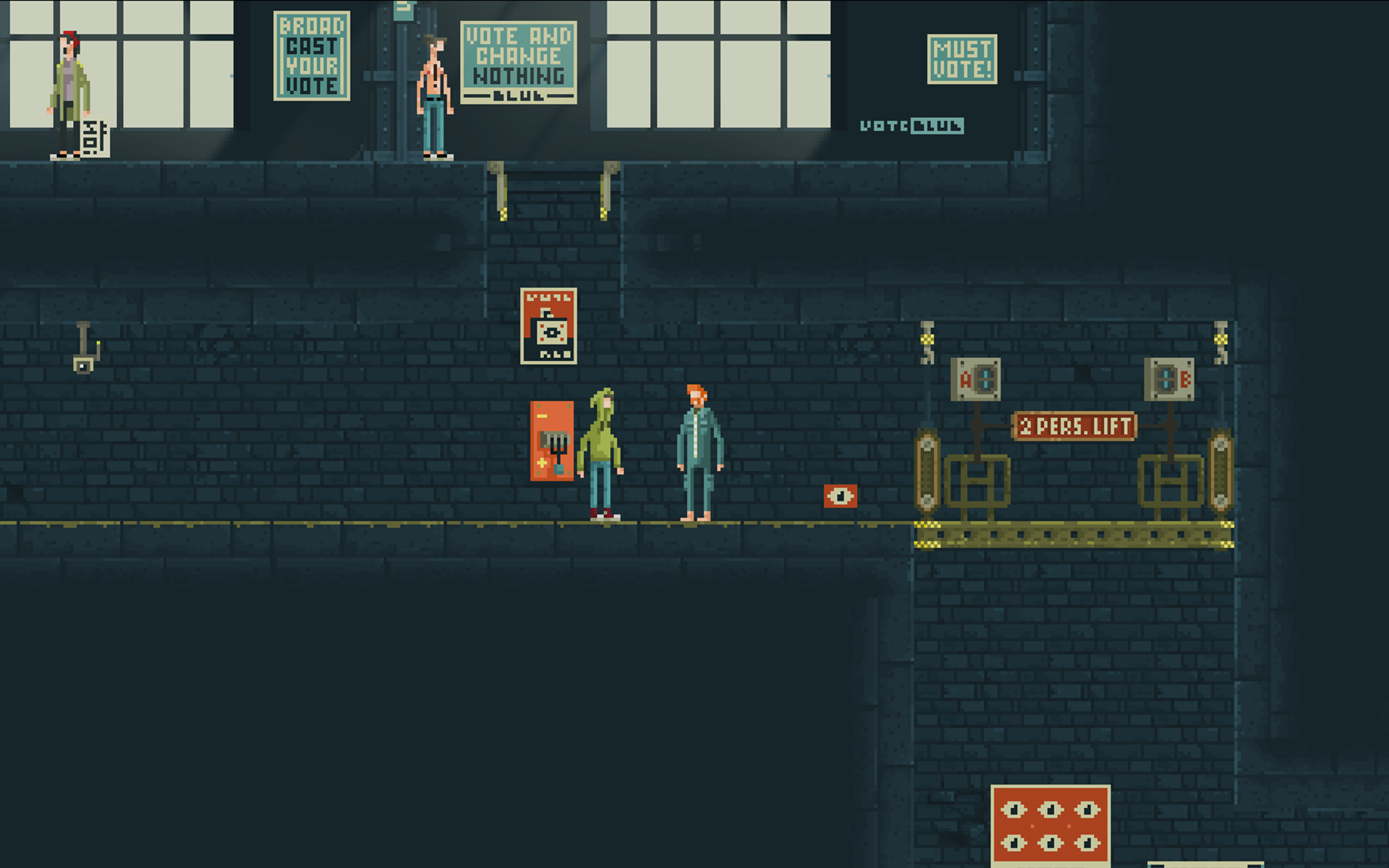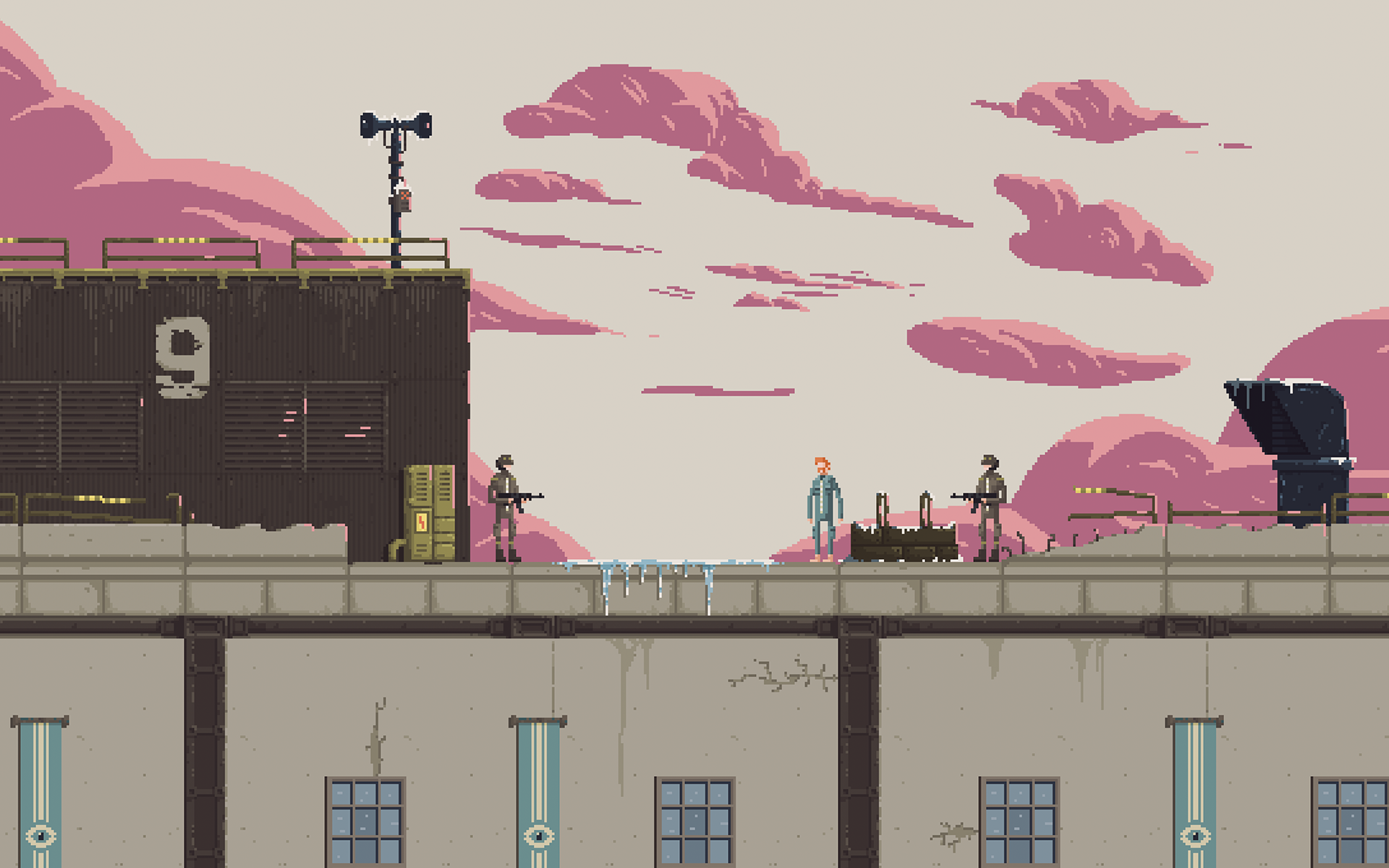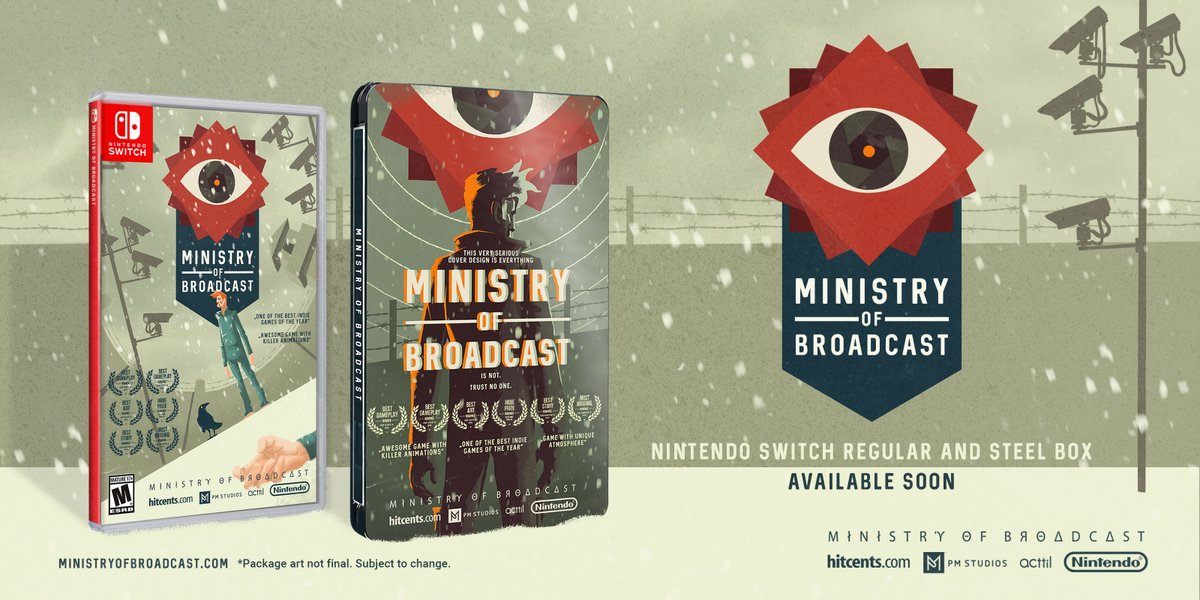Ministry of Broadcast on Tinder-date publishing, primacy of narrative, and walls people like to build
Ministry of Broadcast is a narrative-driven cinematic platformer released on January 30. The game is set in a dystopian country divided by the Wall, and to get to the other side, you must survive the reality show run by the omnipresent Ministry of Broadcast. Expect traps, tons of moral ambiguity, and brilliantly somber humor in the vein of Monty Python.
The team behind the game is eponymously named Ministry of Broadcast. It consists of four people: Petr Škorňok, Dušan Čežek, Sanja Čežek, and Petr Melicherík.
I was lucky to catch up with half of the studio represented by Petr Škorňok and Dušan Čežek. This interview took place on January 31, the next day after the game came out.
From left to right: Dušan Čežek, Sanja Čežek, Petr Melicherík and Petr Škorňok
Rise of Ministry of Broadcast
Oleg Nesterenko, managing editor at GWO: Let’s start with the beginning. How did the four of you meet and decide to become a studio?
Petr: It all started with me and my friend Pete. We are two Petes (Twin Petes). We’ve been programmers for a while, but we always wanted to make games, so we thought, “Hey, this is our last chance to make games before we have mortgages and babies and wives. Let’s try to make a game we always wanted.” We started looking for designers and artists and we found some nice pictures of the creations that Dušan and Sanja made. So we wrote them an email. This was the beginning from our side.
At that point, did you already have a specific idea for a future game?
Petr: Yeah, we had this idea for a game set in dystopian world, which was inspired by Orwell’s 1984. Originally though, it was supposed to be a 2-D shooter. It was the very first prototype that we made. The player had to clear a series of arenas, each culminating in a boss fight. Obviously, it’s totally changed the direction since then.
Dušan: The only thing left from the original prototype is the arenas Pete mentioned. We kept them, and they became the core of the gameplay. There was a lot of brainstorming around it, and the game grew enormously. We started with around 50 or 60 assets and we ended up with 7,200.
Ministry of Broadcast at work
As for our part of the story, Sanja and I escaped from the advertising background. We both finished art schools and universities. We were, you know, proper artists until a corporation grabbed us into advertising. For awhile it was ok, but then we just got tired. We wanted something different. So we opened our own studio Fuchs+Dachs to make the kind of art that we wanted. Now, we only work on projects we like, the ones that are good for us and our clients at the same time.
That’s how the four of us met: Pete and Pete saw our creations. We just clicked with them because Sanja and I were also playing games, and we wanted to make a game ourselves eventually.
We live in two different cities, Prague and Brno, but after we met several times, we realized that we had similar ideas, sense of humor, and similar stories to tell.
So we naturally merged into Ministry of Broadcast. That’s what we called our new studio. Because this game brought us together.
Petr: And I believe the first breaking point when we decided to continue working together and become one studio was after half a year of development. We created a demo and started going to conferences.
We went to Game Access in Brno, it was the second conference we attended. Pete and I came. Dušan and Sanja came too. We showcased the game to the audience together. And we felt like one team. It wasn’t like Dušan and Sanja working on just one part of the game and us working on the other part, but we just felt like, “Hey, we are doing the same thing! Let’s do this together and let’s find a way to do this full time, to fund the development.” Because back then, we were doing this part time after hours or during the weekends.
On conferences, publishers, and making games in the Czech Republic
Dušan: We won the Best Gameplay award at Game Access 2018 in Brno. And this award helped us reach Tokyo (Tokyo Game Show 2019) right after. It was a natural path to larger conferences, which we realized was our chance to grab publishers and funds.
Petr: We got lucky, and for the past year we’ve been working on a game full time. Well, no, it’s not about luck, I guess, because we visited so many conferences. We made a proper pitch and we tried to pitch the game to any publisher that was willing to listen to us. And at any conference we went to, we tried to find as many contacts as we could. So at the end of the day, it wasn’t about luck but about trying hard.
We found a publisher from Tokyo, it was PLAYSIM, and a publisher from the US, Hitcents. They helped us fund the rest of the development.
Ministry of Broadcast
Two publishers, huh?
Petr: PLAYSIM were the first ones we met. They focus on the Asian market, but we didn’t have a deal with them. Not at first. We were in talks with them for almost half a year. And in the meantime, we met Hitcents in the US at IndieCade in LA, and they wanted to publish our game. They were able to fund the development, but in talks with them we agreed that they didn’t have much experience with the Asian market, and it would be better to have someone focused solely on that region, someone that understands its requirements. So we decided to market the game separately for different regions. Hitcents focused on Europe, the US, Australia, and PLAYSIM are the experts on Asia. It’s just smarter to separate your markets because you can achieve bigger sales and a bigger reach. And at the same time, it’s good for us because our revenues are not coming from one source. Plus, with two publishers, we achieved the full funding that we really needed.
Is there an Asian version of Ministry of Broadcast?
Petr: It had to be translated in Japanese, in Korean. Other than that, they didn’t change anything. Surprisingly.
Dušan: We do, however, have to make one small change for Switch. We need to cover some boobs. I guess we’ll just take those pixelated breasts and pixelate them even more.
You gotta do what you gotta do. For those of our readers, though, who are struggling to get even one publisher, do you mind telling us how you got two? You must have had a killer elevator pitch.
Dušan: Just one picture where we had really shitty graphics, and the writing said “Without your money, we can do this. And with your money, we can do this.” That was our shortest elevator pitch.
The shortest pitch for Ministry of Broadcast
Of course, we pitched with a proper pitch deck as well, but this particular elevator pitch was successful because it was selling the team as it is because we really like to be sarcastic in delivery. So we agreed that we were just going to go with our sense of humor through every pitch and to present ourselves as we are. We didn’t want to get into some bad relationship with publishers who would be hooked up on their own idea for a game and who would change a lot about our vision, and we would be in agony to finish the game.
So from the very beginning we were trying to kind of Tinder-date a publisher. You know? Both need to swipe right in order to work. So that was our approach to pitching.
Looks like you wasted no time at these indie events. You won the Best Gameplay award at Game Access 2018. You were nominated for Best Story, Most Original Game, Best Desktop Game at Game Connection 2018 in Paris. The list goes on. John Romero praised your game. Did it put a lot of pressure on you along the way? Did you feel like now you’d have to live up to all these expectations about your game?
Petr: We just wanted to make a game we would love to play. At the end of the day, it was important to be proud of ourselves as opposed to other people being proud of us. Of course, it meant a lot at the beginning to have John Romero play our game. He really liked it. It was at the beginning of our development, when we only had the first demo. So it gave us a little confidence. But afterwards, we never felt like we needed to make it the way people expected us to. We were just focusing on the things we love.
John Romero playing MoB at Game Access 2018
Are you saying you didn’t necessarily make the game to be a commercial success? I wonder what your publishers think of that.
Dušan: We never told them.
Petr: Just hoping they will also like it.
Dušan: That brings us back to the Tinder-date publishing. We really wanted to find the publisher who would understand what we were doing. The only thing that we were discussing with one of our publishers is whether we should have a happy ending or not. There is this cultural difference between the US and Europe. Since we are from Eastern Europe, we grew up on movies that are more realistic, where you don’t have to have happy endings that producers like so much. It’s the director that makes the movie the way they want. In the States though, they’re more accustomed to the producers editing the movies to make them suitable for a wider audience. That’s the only discussion that we have had with the publisher. Not in terms of whether we could do it or not, there was no fighting over that. Just in terms of which would have a bigger effect on the game. To keep it as an artsy European thing or to make it more commercial for the States. The rest of it was completely up to us, and we are really happy that they showed so much support and understanding towards the project.
And here you are, a proper studio. What are you responsibilities across the team?
Dušan: We are really strange that way, as a studio. We believe that we don’t have to have a structure per se. We don’t have specific roles. We have our backgrounds, of course. Which puts Sanja and me in charge of art and Pete and Pete in charge of development, but as for the rest of the game, we have round tables and discuss every single aspect of it together: gameplay, story, even sound design and music design. We like to hear everyone’s opinion. For now, it works given our size.
And being based in the Czech Republic, how do you feel as a studio?
Dušan: Oh boy. You know Amanita Design? The nicest studio from the Czech Republic. They made Machinarium (2009) and all these other beautiful games. And at the same time, you have AAA projects like Mafia or Kingdom Come. I’d say the gamedev scene is torn between really artsy and really commercial, there’s no middle ground. Maybe our game is now somewhere in the middle.
Ah, charting new territories…
Petr: Only for the Czech Republic. Anyway, we didn’t live in other countries. But we talked to other developers. For example, from Switzerland. It would be much harder to get the necessary funding there since you would burn through the money much sooner than you would in the Czech Republic. The cost of living here is a quarter of what you’d have to spend in Switzerland. So when you are pitching to international publishers, you are getting the same funding they would get in Switzerland. But here, this money would just last you longer. This is definitely an advantage.
The world of Ministry of Broadcast
You said it started with a story. A story of a country divided by the wall. Where did that idea come from?
Petr: It’s the climate you could feel around you at that time. And even nowadays, Brexit is happening, isn’t it? People are getting separated all the time. Immigration. Leaders discussing who we should let in, who we shouldn’t let in.
This we connected with the Berlin wall, which was built overnight. It started as a simple fence, but it grew into this massive wall, and it grew and grew, and it was there for so many years.
And we thought what if the regime on one side of the wall struck a deal with all the people who would like to escape the country? I mean, mostly they just say, “No, you cannot leave, you can’t get across the borders.” But what if they could control the escape? They would select people and make a show out of it.
All of these thoughts about elitism, selection of people just resonated with the present-day climate. And somehow the Trump wall fell into this. And now Brexit.
Dušan: I’m going to make our publisher and PR team very happy with this story because they love it when devs put personal experiences into games. Sanja and I were born and grew up in Yugoslavia, which was like this nice utopian country. And during the nineties, the war broke out and separated the country. Nobody asked you if you wanted to live in this country. People stayed where they happened to be on that particular day. Overnight, we were cut off from the rest of the world. We suddenly needed visas to travel anywhere. We could only go out for a limited time. Some supplies were cut off. I remember we didn’t even have gasoline for cars, people were waiting for three or four days, just to have one tank filled. And the media played a huge part in this. There was a real war, and a media war.
We lived through it. We didn’t necessarily want to recreate this experience in the game, but it felt natural to talk about it. It just resonated with the vision of the world we live in now. How we are all connected through social media, but we are spying on ourselves, broadcasting everything, selling ourselves through reality shows. We’ve never felt more distant being the most connected at the same time.
Subtle references in MoB
And that’s something that we really wanted to tackle. So, yes, the Trump wall is something that people in the States would mention, but there is North Korea in Asia, there was Berlin wall. We have our own walls today, Brexit and everything. I guess people like to build walls. And that’s something that’s really universal for all cultures.
Which is why we call the regime in our game just “The Regime.” It doesn’t have to be a specific absolutist state. Maybe it’s even a democracy. It doesn’t matter. If you strip communism of its trademarks, or if you strip capitalism, then it’s actually the same regime of control, just controlling people in a different way.
We wanted to combine the capitalist state with an absolutist ideology to create this unique regime that is based on money and broadcasting. Every regime, in order to survive, needs strong media presence. In Ministry of Broadcast, they’re letting you escape through a reality show, which underscores just how absurd the world we live in is, with all the media attention, how it is just a smokescreen for reality. You never know what the truth is.
And that’s something that we wanted to implement. The game is playing with you. You don’t know where you are, what’s happening, what world you are in. At one moment, you’re being chased by a crocodile, at another, guards are shooting at you. Whatever it takes for the show to go on.
Making Ministry of Broadcast: Level design, controls, genre, art, engine
Let’s talk development.
Petr: The game is separated into days. There are five of them. Each in-game day we started from scratch because Dušan and Sanja didn’t want to reuse the same assets all over the place. So for each day, we sent blocks to them, then they came up with a new environment for that day and they sent it back to us, and we realized that suddenly those blocks didn’t work anymore because the environment was different. We iterated our designs until we found the real true match.
Another thing that Dušan and Sanja did is that they didn’t approach level design as level design, but more as interior design.
Dušan: We let the environment be influenced by mechanics, and the mechanics are in the same way influenced by the environment. We hate it when you have an obvious puzzle in games, you know, when you find yourself in the middle of some beautiful landscape and then suddenly you walk across a puzzle that just doesn’t belong there.
Petr: We didn’t want to have puzzles just for the sake of the puzzles. Instead, we tried to make puzzles that make sense, that push the story somewhere. For example, the way you have to solve them affects your relationships with the other characters.

Ooh, I like that! Marrying the story and gameplay!
Petr: The story dictated everything. What genre our game should be, what our controls should be.
What about controls?
The other Pete came to me one day and pitched the Prince of Persia style of controls [Prince of Persia, 1989—Ed.]. And I was like, “Whoa, I’m not sure if this is a good idea because nobody does these controls now.” Mostly everybody’s talking about “tight controls” like in Celeste. But then we were brainstorming on this with Dušan and Sanja, and it kind of started to make sense.
You press a key and the character only moves after a slight delay. It makes you feel like you are a kind of puppeteer and you are controlling a puppet. And we felt this perfectly fits the theme of 1984 and Big Brother because through this, the player becomes Big Brother. He is controlling the protagonist and making him do things the character wouldn’t do on his own. It’s small things like this. For example, the character stops at the edge of the ledge. He almost doesn’t want to jump by himself unless you push him really hard.
It was the feature that cost us the most time. We kept developing the controls throughout those two years. It’s an ongoing fight, we’re still trying to improve it.
Dušan: Actually, for each conference we went to, we had slightly different controls because we wanted to test our iterations on players.
But ultimately, the idea was to reward people with the story. They need to do something in order to get more of the narrative. And we think that unlocking the story is really satisfying. And that’s something that we would lose if we just made controls easier.
There’s one review that went out this morning, and the guy said that the controls are kind of a puzzle on its own. That’s exactly what we wanted to achieve, and this guy recognized it, so it was like a nice pat on the back.
And the genre of platformer also fitted your narrative?
Dušan: Yes. We’re talking about the system where you are like a mouse in a maze and you cannot walk freely around.
We considered making certain areas more open-world, but it wasn’t right for the story. You know, we wanted you to feel that there is a system which controls every action. Like you are expected to go left and that’s it. You cannot go more linear than this.
Petr: Even with any choices you will eventually make in the game, you shouldn’t have the feeling of being in control. The regime is in control, you are just a puppet. You are not smarter than them. We wanted to create this feeling of oppression.
And we had long discussions on whether we should do combat like in the classic Prince of Persia with its sword fights. We even had prototyped for combat, but then we thought that this would make the player feel powerful. And you shouldn’t feel empowered, you should feel that you are a prisoner. So we decided to not have combat in a classical way and work with these constraints that will make you hurt other people to avoid traps.
We also knew from the beginning that we didn’t want to have any out-of-place UI elements like big flashing arrow showing you where to go. We decided to incorporate the UI into our environments, to have hints and arrows inside the level itself. And then we realized that this is what Oddworld [Oddworld: Abe’s Exoddus, 1998—Ed.] did too.
So it was a strange combination of ideas drawn from other cinematic platformers.
Right. But weren’t you concerned there are just too many pixel art side-scrolling platformers these days?
Petr: True. Which is why we decided to make a cinematic platformer. There are not so many of those. It’s like a sub-genre. That’s one thing that differentiates us. Then there are our controls. And then, definitely, the art direction that Dušan and Sanja took makes the game stand out.
Dušan: We tried to go for a limited color palette. We wanted to integrate the brutalist shapes of the Russian avant-garde and the Czech avant-garde with the glamour of the thirties. If you remember those posters for the Swiss Alps for the rich guys, where everything is pastel, surreal and beautiful. And so we took those distinct aesthetics and combined them because we felt that this regime of ours shouldn’t come across as threatening.
We wanted to avoid the Soviet red flags. We wanted to avoid this Nazi look that everyone is going for to show an absolutist regime. The regime of MoB went through a PR treatment. They changed their flags to baby blue because it’s calm and people like baby blue. They’re really trying hard to hide the fact that they are attempting to rule you. You’re going to feel threatened, but at the same time you’re going to feel loved. That’s something that we wanted to show through the pixel art. Our color palette only has eight colors. So it was really hard to build backgrounds that characters would fit in without colors overlapping, but I think that the result is ok.
The result is gorgeous. And you achieved it on GameMaker: Studio 2, right? Why did you choose it?
Petr: We had a big discussion at the beginning if we should use GameMaker or Unity. Me and Pete, we are experienced programmers, while GameMaker is often viewed as a tool for beginners. But we saw what you are able to do in GameMaker. Everybody knows about Hyper Light Drifter, right?
So we wanted to push the tool to the limit. This would allow us to get on GameMaker Showcase. We figured it would be nice to stand out on this platform instead of being just one of many games made in Unity.
So this was the idea. But the overall experience using GameMaker from the beginning has been really nice. It enabled us to prototype really quickly. I mean, we were experienced programmers but not experienced game programmers.
Plus, we weren’t heavy on shaders or visual effects. Dušan did everything the old-school way, particles and everything.
The biggest struggle came at the end of the development when the project was really big. It contained thousands of assets, and just launching GameMaker took minutes. I think we reached the limits of the tool, but for this project it was a perfect fit.
You knew when to stop.
Dušan: Exactly. 7,200 assets was its limit in our case.
Petr: And we had a really nice experience porting to the Nintendo Switch, which was surprising because the Nintendo Switch export was kind of new. It was still in beta just recently. But it worked fine.
After release
The game came out yesterday. Did you spend the whole day on social media?
Petr: Oh yes. Googling all day to the point I had to turn off the phone and just go somewhere.
People are mostly praising the game. Any hate at all coming your way?
Petr: Well, we were getting negative comments even before the release because people were connecting the Wall from the game with the Trump wall. We were prepared for this. But to be honest, other than that, we didn’t have any hate, did we, Dušan?
Dušan: No, we didn’t. In general, reviews have been good.
Of course, some of the new guys are not really comfortable with the controls. We expected this.
Petr: Yeah. Because nowadays players expect having all the accessibility features, having a story mode difficulty.
Dušan: And like Pete said before, that’s something that we’re still discussing. Like, should we do a patch just for people who want to change the controls a little bit? We are not changing it completely because that’s part of the narrative, but we are also thinking about the new generation of players who are more comfortable with tighter controls.
What’s going on at the studio right now?
Dušan: Now we need to finish the Switch version. It’s going to be out in early spring. And we are now producing the boxes with the publisher. We are going to have a collectible edition with a steel box and a regular one. And we are already talking about the next project, what is the next step for the studio.
The retail versions of MoB for the Nintendo Switch
I figured the next logical step would be to start drinking in celebration…
Dušan: Yeah, about that… All of us are either young parents or expecting babies any day now. So no drinking for us. We’d rather get some sleep.
Petr: Too many releases at the same time.
Ok then, what is it that you are planning to do now?
Dušan: We are talking about what, for example, the world looks like on the other side of the Wall. That’s one of the ideas. It’s being sold as the ideal place to live? But is it true? Is it???
So you are not done with the game? Should we expect DLCs? Or Ministry of Broadcast 2?
Dušan: Maybe we’ll make one of those things. Or maybe we’ll explore something completely different and then return to Ministry or Broadcast if people like the game. Or we’ll just take a little break. The game was released yesterday, so we’re still emotionally drained from this. And there is still the Switch release upcoming. It’s a completely different audience, completely different PR, marketing and everything. So we need to survive that one as well.
You are almost making it sound like another level from your game. Well, good luck surviving it. Or, as they say in a certain platformer, good broadcast!
Dušan and Petr: Good broadcast to you!
